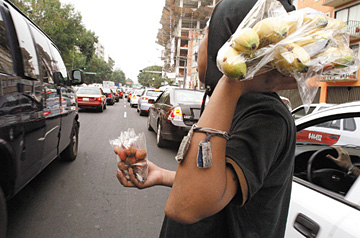
|  |  |  Editorials | Issues | May 2009 Editorials | Issues | May 2009  
Mexico Kids' Bill Splits Advocates
 Nacha Cattan - The News Nacha Cattan - The News
go to original


| | (The News/Rodrigo Oropeza) |  |
A new bill making its way through Congress that would order social services to pull working children off the street has created a rift among child advocates over how to resolve the problem.

The bill would require state and municipal authorities to bring children under 14 years of age to social assistance centers if they are found living or working in the streets. Public servants who turn a blind eye to the problem would be fined up to 5,000 pesos.

"Unfortunately, in both urban and rural settings, child exploitation has become the norm," says the bill, sponsored by Sens. Mario López Valdez and Adolfo Toledo Infanzón of the Institutional Revolutionary Party, or PRI.

"Thousands of children have been forced to abandon their schools to work, suffering forms of slavery.

"They are exposed to violence, neglect and illness, and today more than ever, to accidents, drug addiction and abuse by adults, who at times are members of their own family, while the government does nothing to eradicate this problem from our society," the bill states.

In the state of Guerrero alone, 202,000 minors bring in income for their families and 58,000 of them have deserted schools, the bill states, citing the National Statistics Institute, or INEGI.

But a group of child advocacy groups are attacking the bill, saying it would wrongfully separate children from their parents who have been forced by poverty to live or work in the streets.

The bill "criminalizes poverty" without offering public policies to improve conditions for children, and in fact could lead to police extorting street children, said a group of 60 organizations led by the Children's Rights Network in Mexico.

"The proposal does not account for the complexity of this phenomenon," states a letter sent by the children's group to the bill's sponsors.

"Instead it reduces the matter to the use of force, and it pressures public institutions that lack the conditions, infrastructure and specialized personnel to guarantee the rights [of children]."

Previous government efforts to take children off the street have failed mostly due to a lack of resources, institutions and training, UNAM sociologist Dolores Muñozcano said. Few comprehensive studies exist to help policy experts and social workers understand the sources and extent of the problem, she said.

"When children are living in the streets for a longer period of time they almost never end up staying in an institution. They escape," she said.

López Valdez and Toledo Infanzón, the bill's sponsors, did not respond to requests for comment, but the conservative National Parents' Union, a non-governmental organization, supported their initiative.

While the bill could be refined so that each child's case is studied separately, the legislation would finally force the government to increase attention to the welfare of children, said the organization's president, Guillermo Bustamante Manilla.

"It is urgent that we do something for these street children," Bustamante Manilla said. |

 |
|  |



